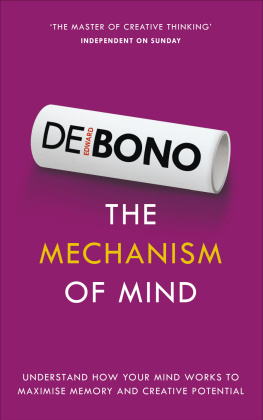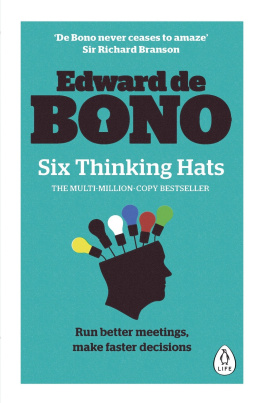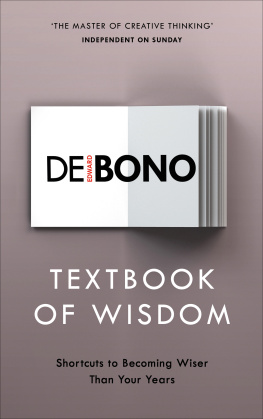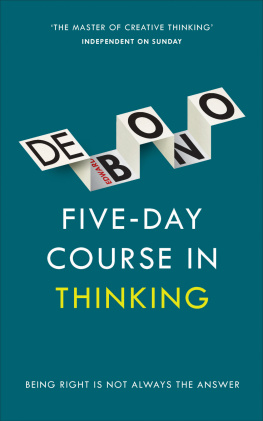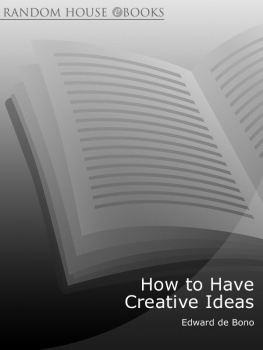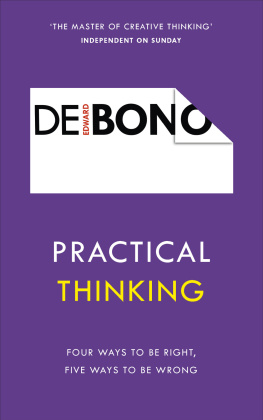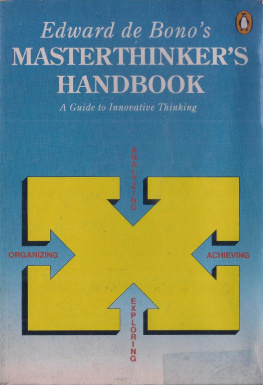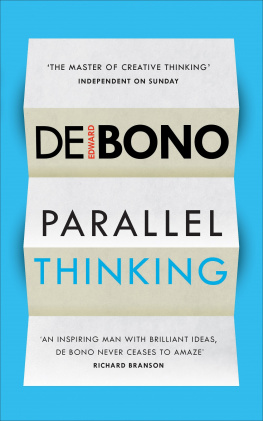About the Book
The classic bestseller presenting Edward de Bonos model of the mind.
The Mechanism of Mind presents Edward de Bonos original theories on how the brain functions, processes information and organises it. It explains why the brain, the mechanism, can only work in certain ways and introduces the four basic types of thinking that have informed de Bonos lifes work: natural thinking, logical thinking, mathematical thinking and lateral thinking.
About the Author
Edward de Bono studied at Christ Church, Oxford (as a Rhodes Scholar). He also holds a PhD from Cambridge and an MD from the University of Malta. He has held appointments at the universities of Oxford, London, Cambridge and Harvard.
In 1967 de Bono invented the now commonly used term lateral thinking and, for many thousands, indeed millions, of people worldwide, his name has since become a symbol of creativity and new thinking. He has written numerous books, which have been translated into 34 languages, and his advice is sought by Nobel laureates and world leaders alike.

This ebook is copyright material and must not be copied, reproduced, transferred, distributed, leased, licensed or publicly performed or used in any way except as specifically permitted in writing by the publishers, as allowed under the terms and conditions under which it was purchased or as strictly permitted by applicable copyright law. Any unauthorized distribution or use of this text may be a direct infringement of the authors and publishers rights and those responsible may be liable in law accordingly.
Version 1.0
Epub ISBN 9781473527577
www.randomhouse.co.uk
1 3 5 7 9 10 8 6 4 2
Vermilion, an imprint of Ebury Publishing,
20 Vauxhall Bridge Road,
London SW1V 2SA
Vermilion is part of the Penguin Random House group of companies whose addresses can be found at global.penguinrandomhouse.com

Copyright IP Development Corporation 1969, 2015
Edward de Bono has asserted his right to be identified as the author of this work in accordance with the Copyright, Designs and Patents Act 1988
For enquiries please contact de Bono Global Pty Ltd
www.debono.com
First published by Vermilion in 2015
First published by Jonathan Cape Ltd in 1969
www.eburypublishing.co.uk
A CIP catalogue record for this book is available from the British Library
ISBN 9781785040085
CONTENTS
THERE ARE THOSE who suppose that the brain will for ever remain a mystery. There are those who suppose that one day the way the brain works will be revealed in all its detail. Of what use would such knowledge be? Would the problems of mankind be suddenly solved by a surge of understanding? Would one be able to make practical use of the knowledge?
This book is to do with the way the brain becomes mind. It may be that the brain is not too difficult to understand, but too easy. Matters are often made more and more complex by the ability of man to play elaborate games that feed on themselves to create bewildering structures of immense intricacy, which obscure rather than reveal. The only thing these structures do reveal is that man has the ability and the compulsion to play such conceptual games. Indeed, it is the nature of the brain with which he is examining the brain that makes him do so. Ideas must advance; if they miss the right direction they move farther and farther in the wrong direction. In matters of introspection, movement is unlimited. The track can never run out, since it is created by the moving imagination, just as there are military vehicles which lay down their own track ahead of them as they cross trackless swamps.
Of its own accord the brain does not seek to understand and explain, but to create explanations and that is a very different thing. The explanations may be highly acceptable without having much relevance to what is being explained. Can one escape from the circular self-satisfaction of elaborate philosophical description? In this book the brain is described as the mechanical behaviour of mechanical units. It is the organization of these units that provides the mechanism of mind.
Why does one bother to think about things, to talk about things, to write about things? Why does one imagine that other people ought to be interested in what is being said or what has been written? If one is describing something, then one hopes that the beauty of the description may be appreciated. Even in a description one may seek to reveal something that one supposes not to be apparent to everyone else. As one seeks to reveal more, so one moves from description towards explanation. In explanation one tries to reveal how something unfamiliar is only a special arrangement of things that are already familiar. We do know how these familiar things work, so we can tell how the unfamiliar whole must work. We want to know how it works in order to make better use of it, perhaps change it, perhaps improve it, perhaps prevent it going wrong, perhaps repair it. Above all, we usually want to be able to tell how it is going to behave in general and also under special circumstances. If the purpose of description is beauty, the purpose of explanation is usefulness. To say that a lawn undulates is description; to discover the buried tree roots is an explanation which may bring about their removal.
It is for the reader and not the writer to assess the usefulness of what is set down in this book. Nevertheless, it is possible to point to one definite and very practical example of the usefulness of the explanation offered.
Words usually describe things or actions, which are just things in motion. There are, however, a few words which do not describe things, but which provide tools for dealing with other words. Multiplication, division, addition and subtraction are special ways of dealing with quantities. Each of these processes is represented by a symbol which becomes a tool for carrying out the process. Words like not and if are tools for dealing with other words and carrying out certain processes. In this book a new tool is suggested. This is a new word which does not yet exist in any language. It is used to carry out a process which cannot otherwise be performed. Once this word has been invented and its function defined, then people can become as accustomed to using it as they are accustomed to using the word not. When this happens, it will be possible to think in ways that are not yet open to us. These different ways of thinking will be especially useful for generating new ideas and solving problems. But by far the most important use of the new word would be to prevent the emergence of those widespread and fierce problems which are actually created by the limitations of language and mind. Even the mere existence of the new word, whether it is used or not, would help in this regard.
New words are continually being invented to describe new things. But to invent a new functional word, a new tool for thought and language, is a different matter. It has never been consciously done before in the whole history of language. What justification can there be for so presumptuous a step? What function would the word perform? Why is the word necessary?

